Borrowing costs jump as traders unpick Hunt's Autumn Statement
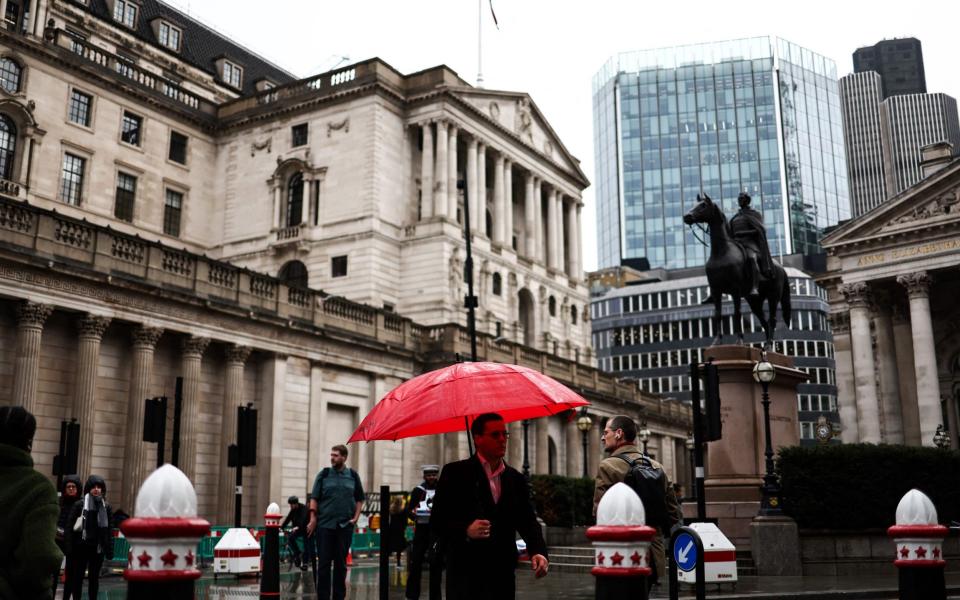
Short-term Government borrowing costs have risen at their sharpest pace since October in the wake of Jeremy Hunt’s tax-cutting Autumn Statement.
The yield on two-year UK gilts - the return that the Treasury promises to pay buyers of its debt - jumped 10 basis points to 4.7pc, its steepest gain in a month.
The slump in the bond market - prices move inversely to yields - comes as investors and economists analysed the spending implications of the Chancellor’s Autumn Statement.
Paul Johnson, director of the Institute for Fiscal Studies, said the “substantial tax cuts” announced are being “paid for by planned real cuts in public service spending”, adding the Chancellor would only meet his fiscal rules of cutting debt as a proportion of GDP based on “a series of questionable, if not plain implausible, assumptions”.
Meanwhile, economists at Goldman Sachs suspect the Bank of England will fear that cuts to National Insurance will push up pay growth and inflation, delaying the point at which they can cut interest rates.
Money markets have pushed back their expectations for a first rate cut to happen by September, compared to June before the Chancellor’s speech.
Read the latest updates below.
06:28 PM GMT
Signing off
Thanks for joining us today on this live blog. My colleague Chris Price will be back in the morning pouring over charts, annual reports and stock market announcements to keep you up to date with what’s happening in the markets.
I’ll leave you with some commentary from Mark Sedwill, a British diplomat and former Cabinet Secretary, who says that a new Cold War between China and the US is not inevitable.
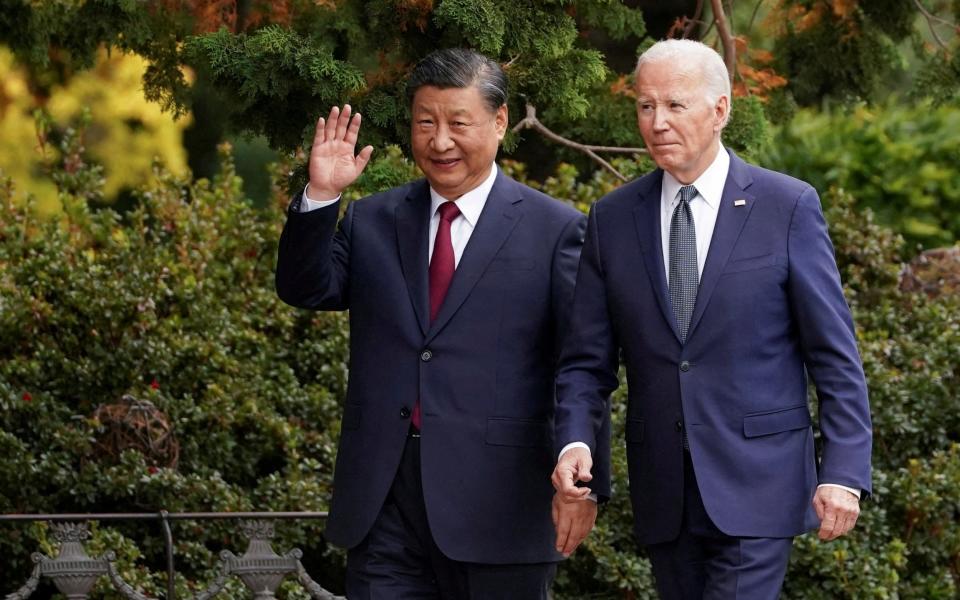
06:19 PM GMT
North Sea oil could face 'sudden demise' from negative politicians
Political parties in Scotland have been accused of engaging in “student politics” amid oil and gas industry turmoil. Matt Oliver reports:
Labour and the SNP have been accused of putting the North Sea’s energy industry at risk of “sudden demise”, a day after the closure of Scotland’s only oil refinery was announced.
Business leaders in the heart of Scotland’s oil industry accused the two parties and their leaders of putting thousands of jobs at risk by making negative and “muddled” statements about the energy sector.
Ryan Crighton, head of policy at the Aberdeen & Grampian Chamber of Commerce, said the industry was “rapidly approaching” a “cliff-edge” because of net zero “and right now, it feels like Thelma and Louise are at the wheel”.
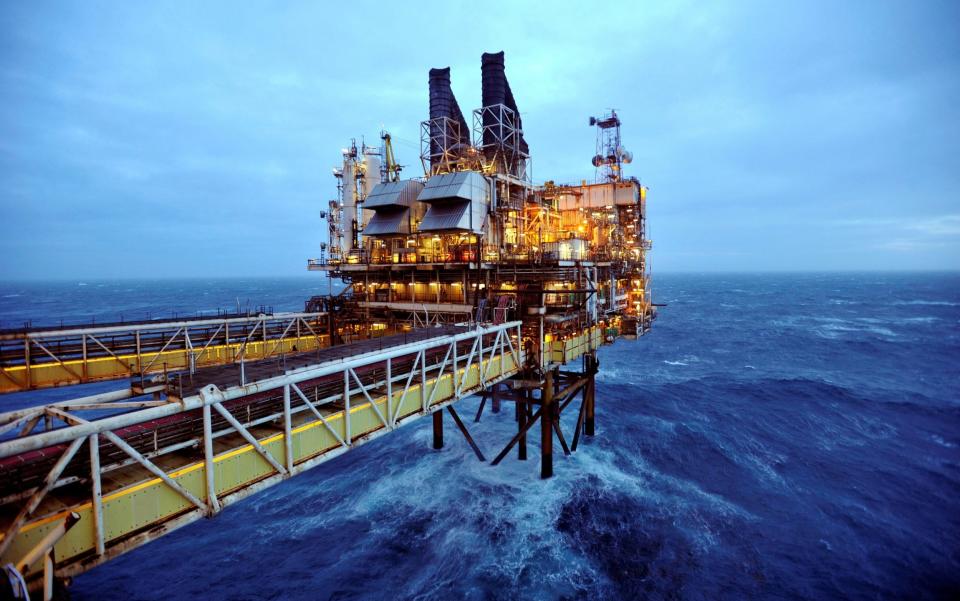
06:15 PM GMT
Yield on UK government debt jumps 10 basis points
By the close of trading, the yield on two-year UK gilts - what the Treasury promises to pay buyers of its debt - had jumped a whole 10 basis points to 4.7pc.
06:04 PM GMT
Rail strikes hit sales at bar group Nightcap
An Aim-listed cocktail bar group led by a former Dragon’s Den panellist has blamed strikes and warm weather for a slump in sales.
Nightcap’s chief executive, Sarah Willingham, said that trading in the 13 weeks to Oct 1 had “been adversely impacted by September’s record warm weather, the ongoing cost of living crisis and significant train strikes deliberately targeting payday weekends to cause maximum damage”.
She said the weather “reduced the demand for socialising in basement bars”. Like-for-like sales declined by 16.7pc over the 13 weeks, but overall revenues were 42.7pc higher at £14.7m, boosted by the purchase of the Dirty Martini chain.
On Thursday, Nightcap also reported a pre-tax loss of £4.9m for the year to July 2, despite growing its revenue by 29pc to £46.4m.
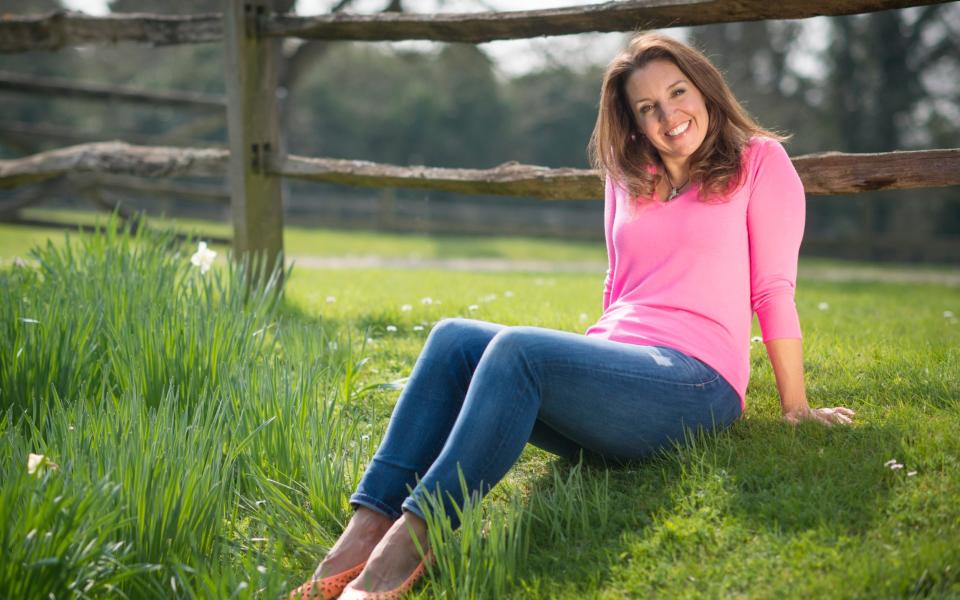
06:00 PM GMT
Klarna wins FCA approval
The Financial Services Authority has said that Klarna can continue to offer loans and card products in the UK, just weeks before the lender’s temporary licence was due to expire.
The new authorisation, which replaces one given to the Stockholm-based company in the aftermath of Brexit, does not cover Klarna’s best-known service in the UK, which lets consumers make purchases at many online retailers with a loan they can pay back in three interest-free instalments. These buy-now-pay-later (BNPL) loans are currently unregulated.
Abby Vickers of Klarna UK, said: “The FCA approval puts Klarna’s successful UK business on a secure regulatory footing ahead of the expected regulation of BNPL”.
Klarna has reported revenue for £1.2bn for the UK in the first six months of 2023, up 20pc on the previous year.
05:40 PM GMT
Wildfires, flooding and air traffic control disruption cost Jet2 £14m
Package holiday firm Jet2 took a £14m hit in lost profits from the summer’s air traffic control disruption and from wildfires and flooding on Greek islands.
But turnover and profits both lept for the six months to the end of September as price rises failed to put off customers. Revenue reached £4.4bn, up 24pc on the previous year and pre-tax profit reached £661m, up 47pc.
The average price for a package holiday rose 11pc to £855, while flight-only tickets rose 18pc to an average of £124.09.
Jet2 said that it has increased capacity for next summer, with 12pc more airline seats available, and that bookings are slightly higher than they were at this point a year ago.
Steve Heapy, the firm’s chief executive, said: “We are pleased to have delivered another strong financial performance during the first half of the financial year, despite the well-publicised external challenges faced.”
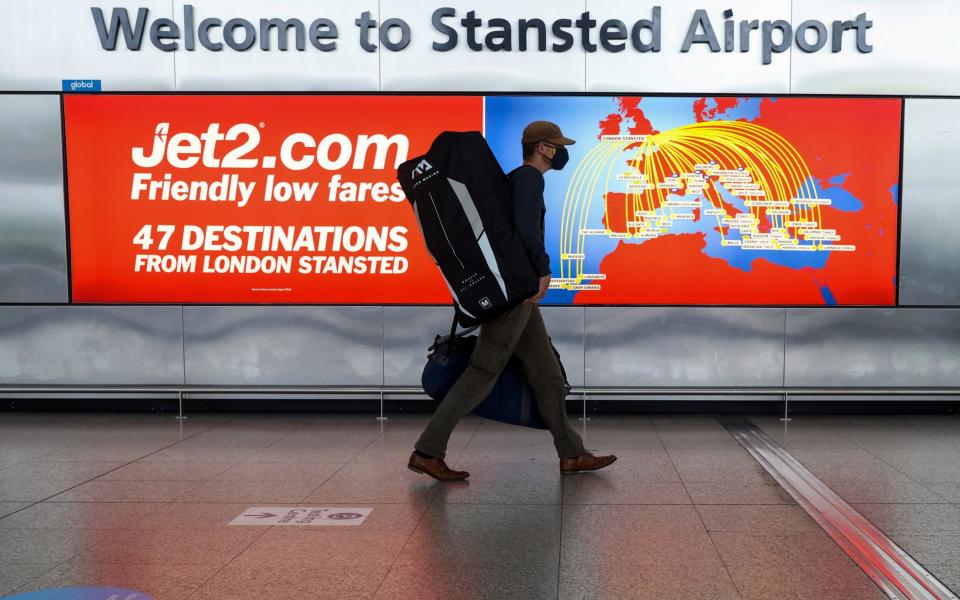
04:52 PM GMT
FTSE 100 ends the day in the green
The FTSE 100 rose 0.19pc today to 7,483.58, with quality assurance firm Intertek (up 3.42pc) and engineering company Weir Group (up 1.81pc) leading the rises. Vodafone had the biggest decline (down 5.41pc).
The FTSE 250 closed with almost no change at 18,480.83, up 0.0036pc.
04:35 PM GMT
British chipmaker blames Biden's sanctions as it quits China
The British microchip company Graphcore has been forced to pull out of China after sanctions imposed by President Joe Biden blocked sales of its artificial intelligence (AI) technology. Matthew Field reports:
Graphcore, which is headquartered in Bristol, designs semiconductors tailored for AI software, in an effort to compete with $1 trillion (£800bn) US tech giant Nvidia. It had been targeting expansion into China.
However, recent changes to US export controls have hamstrung those efforts as the White House imposes restrictions on exports of advanced processors that can be used to power AI tools. Non-US companies have been caught by the restrictions as many use American-made software and equipment.
A Graphcore spokesman said: “The recently updated US export controls mean that Graphcore - in common with other AI hardware manufacturers - is no longer able to sell IPU systems in China. Regrettably, this means we will be significantly scaling back business operations in China.”
Graphcore has raised more than $700m in funding from investors including Baillie Gifford, Samsung and Microsoft to bring its “intelligence processing unit” - or IPU - chip to market.
While shares in Nvidia, which dominates the market for AI chips, have skyrocketed this year, up 240pc, privately-held Graphcore has faced cuts to its valuation by shareholders.
In April, it emerged that Sequoia, one of its biggest backers, had written off its stake to zero. In its results this week, London-listed investor Molton Ventures trimmed the value of its holding in Graphcore from £37.2m to £21.3m, down 42pc. At one stage, Molton had valued its holding at £113.5m.
Graphcore has urged the British Government to buy its technology as part of efforts to expand the UK’s capacity of AI-capable supercomputing power. However, The Telegraph revealed in August that the Government was likely to buy thousands of parts from Nvidia instead.
04:32 PM GMT
Wegovy and Ozempic maker to build £1.9bn factory in France in boost for Macron
The maker of weight-loss drug Wegovy is spending £1.9bn to build a factory in France in a boost for President Emmanual Macron’s industrial ambitions, writes Hannah Boland:
Danish pharmaceutical giant Novo Nordisk, which also produces diabetes drug Ozempic, has revealed plans to expand its manufacturing facilities in Chartres, southwest of Paris.
Novo Nordisk has already pledged to spend more than £4.9bn to expand its production in Denmark, while this latest proposal will be worth £1.9bn.
Both Novo’s Wegovy weight-loss treatment and Ozempic jab - which also has obesity-fighting side effects - have surged in popularity over the past year as countries seek treatments to ease pressure on health systems.
The drugs have been shown to help people lose around 15pc of their body weight, using an active ingredient called semaglutide which makes people feel full.
Demand has been spurred higher by endorsements from high-profile figures such as Elon Musk, Jeremy Clarkson and Boris Johnson.
Estimates suggest the weight-loss drug market could be worth $90bn (£74bn) within the coming years, compared to $2.5bn last year.
It has sparked a race among pharmaceutical firms to seize market share, although supply has so far been constrained by a lack of production facilities.
The latest move by Novo will be seen as a significant win for Mr Macron, who has been battling to improve France’s industrial competitiveness.
Novo’s investment will more than double the footprint of its Chartes facilities and create more than 500 new jobs.
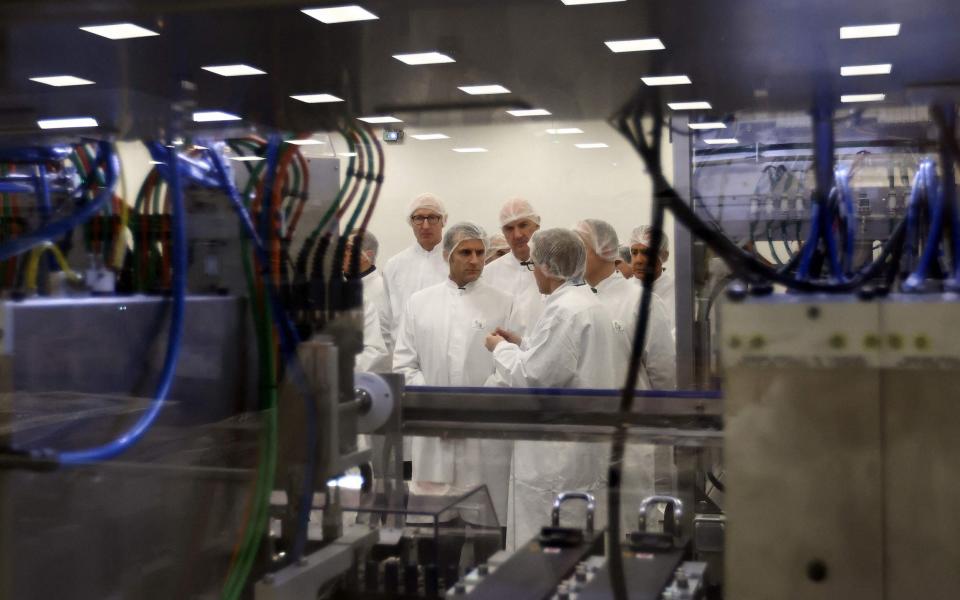
04:26 PM GMT
Music rights fund Hipgnosis loses auditor as turmoil deepens
Hipgnosis Songs Fund says it has launched a tender process to find a new auditor after PwC refused to reapply for the role. James Warrington reports:
It marks the latest setback for Hipgnosis, which lost the backing of shareholders in a crunch vote last month.
The fund said on Thursday it had told founder Merck Mercuriadis to draw up alternative terms for his future role as investment adviser to the company.
It comes after Hipgnosis lost a crunch shareholder confidence vote last month, leaving the board with six months to put forward proposals for the reorganisation of the company or risk being wound up.
Hipgnosis also confirmed that both the fund and Mr Mercuriadis had been served legal proceedings by the music mogul’s collapsed former company.
The lawsuit, which was first revealed by The Telegraph in July, was brought by Hipgnosis Music Limited (HML), which was wound up in 2018 owing £3.6m to creditors.
The suit alleges a “diversion of business opportunity” away from HML. It also alleges that Hipgnosis “unlawfully assisted Mr Mercuriadis with, or received, this alleged diversion”.
Hipgnosis and Mr Mercuraidis said they deny the claims and intend to defend them vigorously.In an update to the stock market, Hipgnosis also said it will appoint independent advisers to carry out due diligence on its portfolio of songs.
The company, which owns rights to songs by artists including Blondie, Shakira and Neil Young, has previously come under scrutiny for the way it values its catalogues.
Hipgnosis pioneered the boom in song rights but has suffered a spectacular reversal of fortunes amid rising interest rates and questions over governance.
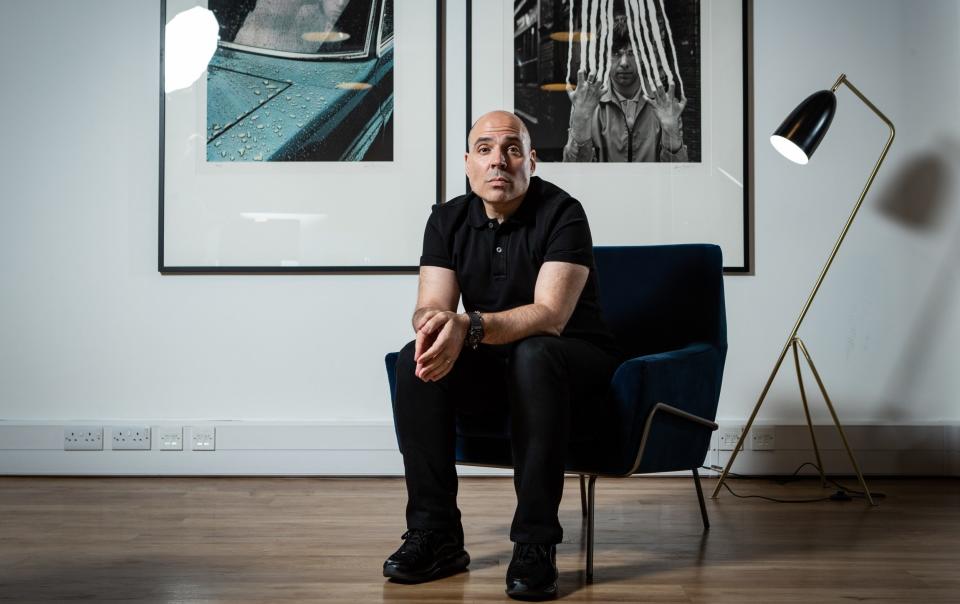
04:16 PM GMT
Smartphone sales rise for first time in two years thanks to iPhone 15
Global smartphone sales have rebounded for the first time in more than two years as the release of the iPhone 15 and a new phone from China’s Huawei bucked the market’s decline. Matthew Field reports:
The smartphone market grew by 5pc in October, according to data from Counterpoint Research, after contracting for 27 months in a row, driven by sales in China and emerging markets.
Phone sales have tumbled amid a lack of must-have new innovations, while phones are lasting for longer, with consumers holding on to a typical handset for more than three years. The second-hand and refurbished phone market has also been growing.
The £500bn global smartphone market can be seen as an economic bellwether, providing an indication of how much disposable income people have to invest in new gadgets.
The growth spurt came after Apple launched sales of the iPhone 15 on Sept 22, with a faster processor and updated charging technology.
Counterpoint Research cited a “comeback” by Huawei, the Chinese smartphone manufacturer, as well as rising sales in India.
In September, Huawei launched a new phone powered by advanced microchips, developed apparently in spite of US sanctions on the Chinese technology giant.
The sales boost came after smartphone sales fell to their lowest point in a decade, driven by an economic slowdown in China and saturation in the rest of the world.

04:12 PM GMT
Intertek tops FTSE 100 risers
The biggest riser on the FTSE 100 today is Intertek, which helps businesses improve the quality and safety of their products and systems. Shares were up 3.3pc as investors looked favourably on its trading update. This showed revenue increasing by 5.1pc for the calendar year to date.
The company said that it was “on track to deliver 2023 targets” and that it was “confident that over time we will return to our 17.5pc peak margin performance and go beyond from there”.
Intertek began life as a testing laboratory in Canada in 1888.
03:52 PM GMT
Premier Inn owner drops after concerns about softer demand
Shares in Whitbread, the owner of Premier Inn, dropped after its closest rival flagged up evidence of slower demand during the final quarter of the year.
Bloomberg reported that Morgan Stanley analysts said that while Travelodge had experienced a strong performance during the period, the budget hotel chain had been hit by a slow start to the fourth quarter.
Whitbread became the largest brewery in the world in the 18th century but sold its drinks interests at the start of this century and has refocused on expanding its a hotel chain. It sold its Costa Coffee chain to Coca-Cola in 2019.
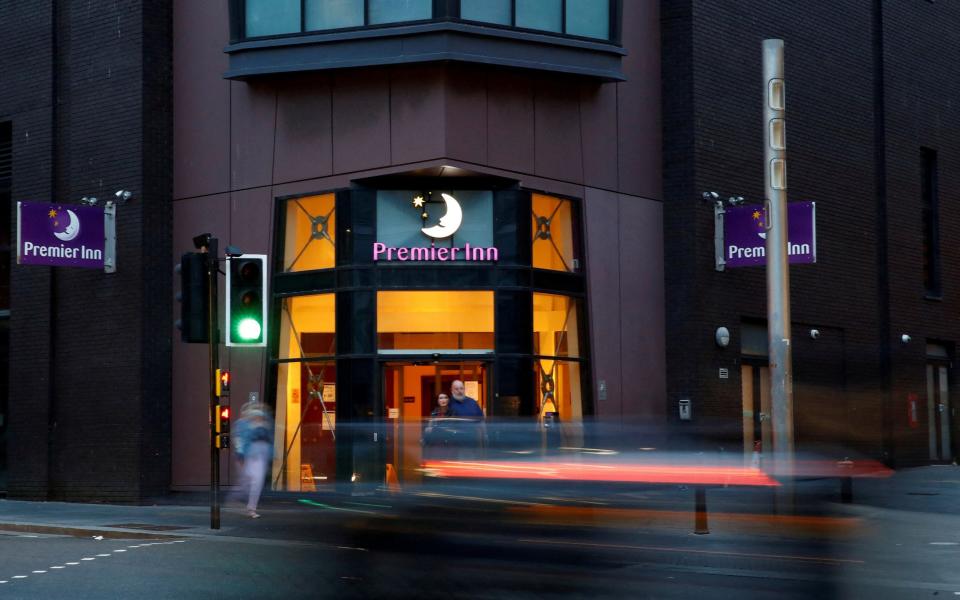
03:30 PM GMT
Handing over
That’s all from me today. Alex Singleton will take over from here and make sure you’re kept up to speed with the latest.
US stock markets are closed for Thanksgiving and Father Christmas has appeared on the trading floor at the New York Stock Exchange to celebrate the 97th Macy’s Thanksgiving Day Parade.
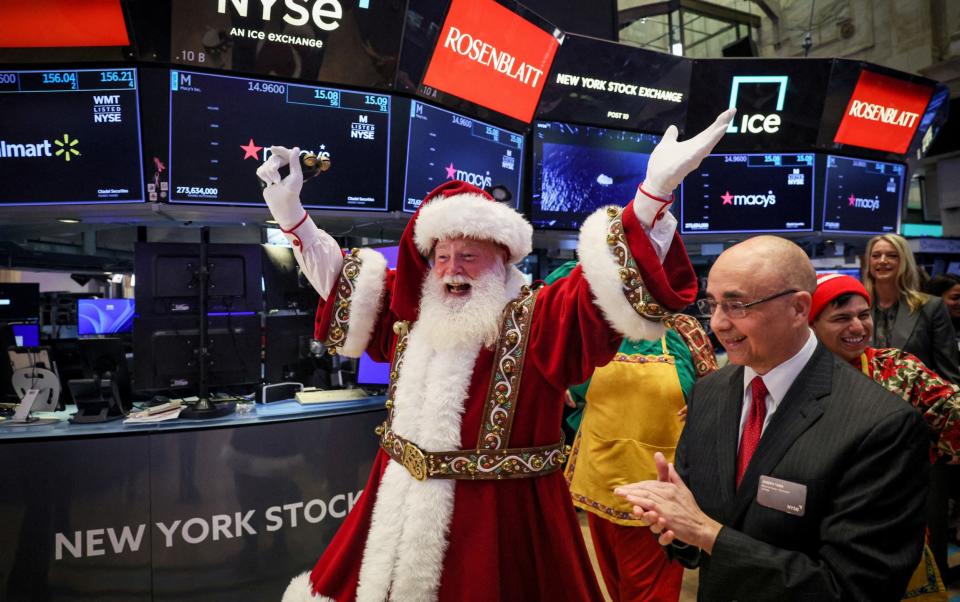
03:13 PM GMT
Autumn Statement 'surefire' to raise debt over time, warns economist
The Chancellor’s decisions in the autumn statement were “a surefire way to end up with debt rising over time”, an economist has said.
Thomas Pope, deputy chief economist at the Institute for Government, criticised Jeremy Hunt’s decision to spend virtually all of the extra money he was forecast to have on Wednesday while accepting higher borrowing at the Budget in March when forecasts were more negative.
He said spending all of the “good news” when forecasts could still change was not “a sensible or responsible way of making fiscal policy”.
Mr Pope added: “That is a surefire way to end up with debt rising over time if you spend your good news and swallow your bad news.”
02:41 PM GMT
Tax cuts mean interest rates will stay higher for longer, economists warn
The Bank of England risks being forced to keep interest rates higher for longer because of stronger growth forecasts, the cut to national insurance and the rise in the minimum wage.
Economists at Goldman Sachs suspect Andrew Bailey and his colleagues on the Monetary Policy Committee will fear the Autumn Statement will push up pay growth and inflation, delaying the point at which they can cut interest rates.
Economist James Moberly said: “A slightly more solid growth outlook reinforces our view that the Bank of England is likely to start cutting rates in the third quarter of 2024 rather than in the second quarter, especially when taken together with the slight upwards pressure on wage growth likely to result from the change in the National Living Wage.”
Economists at Wall Street giant Citi think the first interest rate cut will now come next August, having previously suggested it would happen by May.
Meanwhile, George Buckley, economist at Nomura, said that at a time when policy is finely balanced, an extra boost from the Chancellor will push the Bank to hold rates for longer at 5.25pc.
He said: “With measures worth on average about 0.5pc of GDP across the forecast horizon this further loosening will not go unnoticed by the MPC..
“Thus while the degree of extra fiscal support is a little more limited than that of March, it helps at the margin support the case for keeping interest rates on hold for longer.”
02:28 PM GMT
The calculator that shows Jeremy Hunt’s tax cuts are a farce
There was one huge downer to Jeremy Hunt’s National Insurance (NI) giveaway at the Autumn Statement yesterday – the continuation of the multi-year freeze to income tax thresholds.
Our data projects editor Alex Clark reveals why the tweaks to National Insurance distracted from the Chancellor’s stealth raid:
Income tax thresholds may sound like dull accountant jargon, but the Chancellor is banking on the public not fully understanding the financial implications – and banking billions of pounds in extra tax as a result.
Our calculator shows that someone on £75,000 is paying an extra £2,500 in income tax due to the deep freeze on allowances, far more than the maximum anyone can save from the cuts to NI.
The Chancellor cut NI – slashing the basic rate by two percentage points for employees and by one percentage point for the self-employed – giving a welcome boost to take home pay for millions of workers.
Use our calculator to find out how his so-called “stealth tax” wipes out Wednesday’s giveaway for higher earners.

02:03 PM GMT
Labour face 'tough choices' after Autumn Statement, says Starmer
Sir Keir Starmer said that Labour would have “tough choices” to make after Jeremy Hunt’s tax-cutting Autumn Statement signalled tightened spending on public services beyond the next election.
He said:
I think what you’re putting to me is the extent to which the economy has been damaged. And if we are privileged enough to come into power, I don’t underestimate the challenges that we will face because of the 13 years of failure that we’ve already had.
That will require tough choices. But we have already said where we will increase tax, the non-dom status will be abolished, that money will be used directly for our health service.
We’ve said exactly what we’ll put into our schools. But the underlying answer has to be about economic growth. And if you’re going to have economic growth, you need a realisable plan that’s worked with business to make it actually work.
The Government says it wants growth, but just look at the forecast they’ve got after 13 years of near negligible growth, they’ve now got a forecast that it’s not going to grow very much in the future.
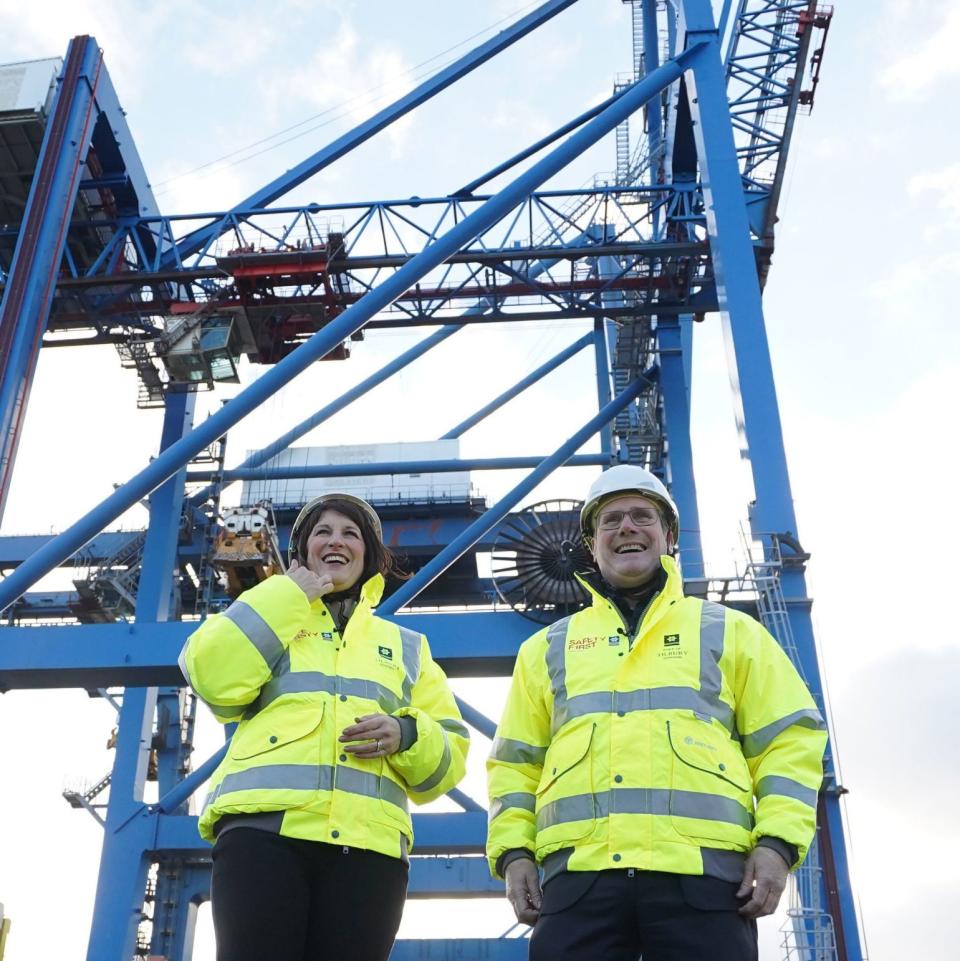
01:59 PM GMT
OpenAI board warned newest algorithm ‘posed risk to humanity’ prior to Sam Altman’s sacking
Senior OpenAI staff warned that a closely-guarded project at the company posed risks to humanity prior to Sam Altman’s sacking, it has been claimed.
Our senior technology reporter Matthew Field has the details:
A project known internally as Q* was said to have been able to accurately solve simple maths problems. While only at the level of a child, AI algorithms have struggled with maths concepts and have so far been more adept at mimicking language.
Mastering maths would be a significant step for the AI industry, representing a leap forward in the race for so-called “artificial general intelligence” that can rival humans.
Just before he was ousted, Mr Altman told attendees at a conference that OpenAI had recently been able to “push the veil of ignorance back” with a major new development.
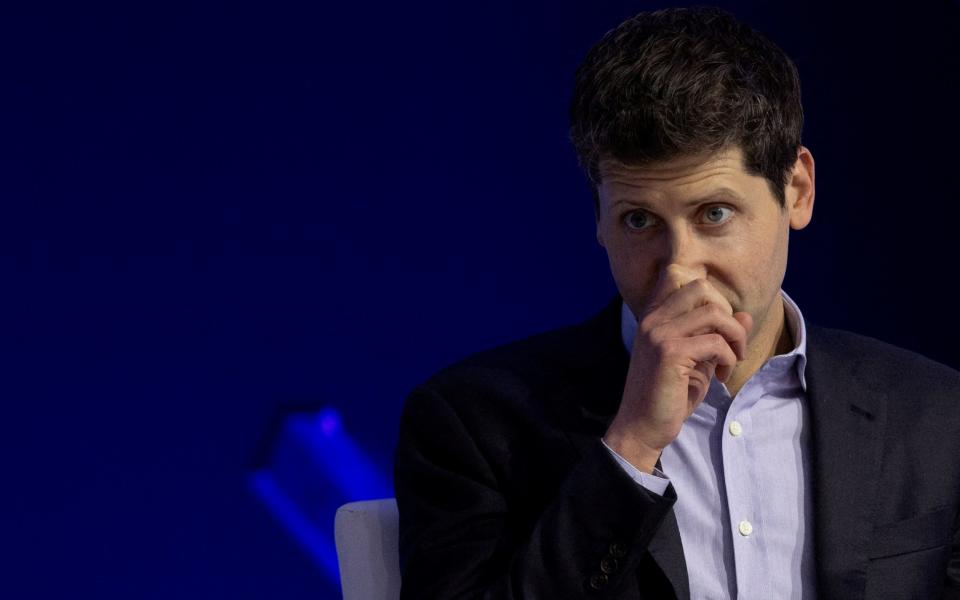
12:56 PM GMT
Britain faces two decades of lost pay growth
Quite an astonishing slide from the Resolution Foundation’s analysis of the Autumn Statement.
The think tank predicts that wages will remain below their 2008 level until 2028:
This is absolutely staggering: wages are now set to remain below their 2008 level until 2028. That's a totally unprecedented TWO lost decades of pay growth pic.twitter.com/l2GQ4OR6mh
— Torsten Bell (@TorstenBell) November 23, 2023
12:50 PM GMT
British business performance 'top of the pack' in Europe
British businesses fared better than European neighbours, closely-watched survey data has shown, as the services sector made a surprise return to growth in November.
Business activity in the eurozone contracted in November, according to purchasing managers’ index (PMI) survey data, although the figures were slightly less bad than economists expected.
Data for Britain was brighter, with companies reporting a marginal return to growth in November after three months of contraction.
The figures sent bond yields higher, with UK gilts also pushed higher amid expectations that interest rates will stay higher for longer.
The yield on 10-year Government gilts - the return paid to buyers of British debt - was up seven basis points at 4.23pc as investors bet that interest rates will likely not be cut in the UK until later next year.
However, British bonds were not an outlier as the yield on Germany’s 10-year bond, the benchmark for the eurozone, rose three basis points to 2.59pc. Yields move inversely to prices.
As Panmure Gordon’s chief economist Simon French points out, British businesses have outperformed their European neighbours for much of the year:
Lots of negative commentary on the UK economic outlook today - but worth noting that the UK's PMI (back to neutral in November) has been top of the European pack for most of the year - and is now at its widest positive spread since early 2022 and the post-Omicron reopening. pic.twitter.com/p3tOzfzTmP
— Simon French (@shjfrench) November 23, 2023
12:35 PM GMT
Rail operator FirstGroup suffers loss after pension switch
Bus and rail operator FirstGroup swung to a loss in the first six months of the financial year as it faced a large one-off hit from its pension plans.
The business said it made a pre-tax loss of £68.4m in the six months to the end of September, down from an £8.7m profit a year earlier.
Much of the loss was down to a hit that First Bus took when it ended its participation in two local government pension funds, and moved employees to another plan instead.
It said it had recognised adjusting charges of around £142m as a result.
Stripping out this and other one-off items, the business said it had actually expanded its adjusted pre-tax profit from £32.9m to £71.3m.
The business backed its outlook for the financial year but its shares were still down 3.5pc.

12:22 PM GMT
No 10 rejects accusations of return to austerity
Downing Street played down concerns that public spending plans for the next parliament will damage public services.
The Prime Minister’s official spokesman said: “Total departmental spending will be £85bn higher in real terms over the next five years compared to the start of this parliament. Departmental spending will continue to grow.
“You’ve also heard the Chancellor talk about the need to improve productivity and to reduce the size of the civil service.”
The official rejected the Resolution Foundation think tank’s assessment that cuts to public spending would be similar in scale to the peak years of austerity.
“I don’t think when departmental spending is significantly increasing that is a claim that adds up”, he said, adding that significant sums are being invested into “priority areas” such as the NHS.
12:15 PM GMT
Autumn Statement 'struck right balance' says No 10
The Government is confident the autumn statement struck “the right balance” in helping the economy and the public, Downing Street said.
Rishi Sunak’s official spokesman was asked about the Office for Budget Responsibility’s chief’s assessment that the Chancellor had found £20bn for tax cuts by choosing not to protect public services against the growing costs of inflation.
The official told reporters:
This is an autumn statement which is about striking the right balance in supporting the British economy, supporting the British public, obviously maintaining the fiscal stability which the Chancellor and the Prime Minister have worked so hard on over the previous year.
We’re confident we have struck that correct balance. Obviously, that requires making difficult choices, particularly on fiscal discipline, in the run-up to this Autumn Statement.
12:00 PM GMT
Oil falls as Opec cartel delays meeting
Oil prices have dropped apparent divisions over supply cuts after the Opec+ cartel of oil producing nations delayed a meeting.
Brent crude, the international benchmark, has dropped 1.1pc toward $81 after a volatile session on Wednesday.
It comes after Opec+ delayed a meeting until the end of the month as disputes reportedly arose over quotas for African members including Angola.
Following the delay, a record high was hit for the use of a financial instrument which is used by traders who believe the market will slump.
About 211,000 Brent crude put options were traded on Wednesday, the biggest volume on record, according to ICE Futures Europe data.
11:36 AM GMT
Pound rises as economists adjust interest rate predictions
The pound has moved higher as investors and economists adjust their expectations for interest rates following the Autumn Statement.
The Chancellor’s decision to hand out tax cuts has raised concerns about inflation, leading money markets to delay their expectations for the first interest rate cuts.
Traders now think there first cut will come in by September next year, having previously bet that it would have happened by June.
The pound has gained 0.5pc against the dollar to head in the direction of $1.26.
Sterling has risen 0.2pc against the euro, which is now worth less than 87p.
11:20 AM GMT
Families to pay £4,300 more in tax despite Hunt’s giveaways
Families face paying £4,300 more tax despite Jeremy Hunt’s cuts to National Insurance and other budget giveaways, the Resolution Foundation has said.
Our economics editor Szu Ping Chan has the details:
In its Autumn Statement analysis, the think tank said taxes were set to rise by the equivalent of £4,300 per household by the end of the decade compared to 2019.
The tax burden is expected to keep climbing every year for the next five years to a new record of almost 38pc of GDP by 2029, well above pre-pandemic levels of 33.1pc
The increase comes despite the Chancellor’s pledge to cut National Insurance from 12pc to 10pc, saving a worker on the average salary £450 a year.
Taxes are rising because of fiscal drag, a phenomenon whereby inflation pushes people into higher tax brackets as their wages rise.
Read why the think tank fears that Britain is facing an “unprecedented” 20-year wage stagnation.
10:56 AM GMT
Pensioners paying more income tax than before Tories took power, says IFS
Pensioners are paying more income tax than they were when the Tories took power 13 years ago, according to the Institute for Fiscal Studies (IFS).
Our economics editor Szu Ping Chan has the latest:
The think tank estimated that a pensioner earning £25,000 a year is now paying about £400 more in income tax than they did in 2010.
This compares with a worker earning the same amount who will be paying “about £1,200 less in income tax and national insurance (NI)”, the think tank said.
Paul Johnson, director of the IFS, said: “Back in 2010 around half of pensioners paid any income tax. Now more than two thirds do.”
The difference is partly driven by Rishi Sunak’s decision to increase national Insurance (NI) thresholds for employees, and for the self-employed in 2022 to ease the burden on workers even as millions have been dragged into higher tax bands. Pensioners do not pay national insurance.
However, Mr Johnson described the levelling of incomes enjoyed by workers and pensions as an “unequivocally a good thing”.
He said: “In 2010 the employee would have paid about £2,750 more than the pensioner, they will now pay £1,250 more.”
10:50 AM GMT
Government to meet fiscal rule based on 'plain implausible assumptions', says IFS
Paul Johnson, director of the Institute for Fiscal Studies, said the “substantial tax cuts” in the Autumn Statement are being “paid for by planned real cuts in public service spending”.
In a post-statement briefing, Mr Johnson said the Chancellor is “by the narrowest of tiny margins still on course to meet his - poorly designed - fiscal rule that debt as a fraction of national income should be falling in the last year of the forecast period”.
He continued:
That is on the basis of a series of questionable, if not plain implausible, assumptions.
It assumes that many aspects of day-to-day public service spending will be cut. It assumes a substantial real cut in public investment spending.
It assumes that rates of fuel duties will rise year on year with inflation - which they have not done in more than a decade and they surely will not do next April.
It assumes that the constant roll-over of ‘temporary’ business rates cuts will stop. It assumes, of course, that the economy doesn’t suffer any negative shocks.
10:45 AM GMT
OBR boss describes lack of detail in Government spending forecasts
OBR chairman Richard Hughes lamented the lack of a detailed spending plan from the Government in the Autumn Statement.
Speaking at a Resolution Foundation event earlier, he said that his fiscal watchdog was working with “four years of just four numbers” on the latter part of Government spending plans.
He said:
There are political choices involved there. What we don’t know is what those political choices are, because their spending framework doesn’t require when to make them.
In any other country in the world, if you look at their fiscal forecasts, they have got a detailed spending plan going out five years, telling you how much they are spending on health, education, transport.
In our framework, these things kind of run out until the Government makes a political decision to run a spending review.
10:37 AM GMT
Hunt has pencilled in harsher cuts to public services, warns IFS
The Chancellor was able to deliver tax cuts in his Autumn Statement by banking larger tax revenues as a result of higher inflation and making cuts to public services, the head of a think tank has said.
Paul Johnson, director of the Institute for Fiscal Studies, said:
The fiscal forecasts have not in any real sense got better. Debt is not declining over time. Taxes are still heading to record levels.
Spending is also due to stay high by historic standards, not least because of high debt interest payments.
But those payments plus pressures on health and pension spending mean current plans are for some pretty serious cuts across other areas of public spending.
How did Mr Hunt afford tax cuts when real economic forecasts got no better? He banked additional revenue from higher inflation, and pencilled in harsher cuts to public spending.
I’m not sure I’d want to be the chancellor inheriting this fiscal situation in a year’s time.
10:05 AM GMT
Hunt will spend all the gains from higher taxes, says OBR chief
Office for Budget Responsibility chief Richard Hughes said the Autumn Statement was “seemingly full of puzzles and paradoxes”, partly due to the impact of high inflation.
Speaking at a Resolution Foundation event, Mr Hughes said:
It seems to be an Autumn Statement where taxes are being cut but the tax burden is going up; where the Autumn Statement is boosting growth, but the economy is growing more slowly; the economy seems to be performing worse, but it’s generating more revenue for the Chancellor.
We are not used to having unexpectedly high levels of inflation in the UK, it has been a long time since we’ve seen inflation in double digits.
Chancellor Jeremy Hunt benefited from the impact of higher wages on tax receipts, with the frozen thresholds resulting in millions more people dragged into the tax system or into higher bands.
Mr Hunt pumped £5bn extra into public spending “but he would have had to add £25bn” if he wanted to keep them the same in real terms.
Mr Hughes said: “So, what effectively he did is allow the real spending power on public services to fall by £20bn and instead he took the extra £30bn he got from what we call fiscal drag and basically gave it back to taxpayers in the form of a rate cut on NICs, and he gave it back to businesses in the form of full expensing in the corporate tax system.”
He added: “The bottom line of this Autumn Statement is basically zero in borrowing terms.”
10:00 AM GMT
Surprise return to growth for Britain's service sector in boost for economy
Britain’s private sector grew at its fastest pace in four months, according to a closely-watched survey, as businesses were boosted by the breather in interest rate rises.
The UK’s dominant services sector unexpectedly returned to growth according to the latest S&P Global/CIPS Flash UK purchasing managers’ index (PMI).
The sector delivered a reading of 50.5, up from 49.5 the previous month and ahead of analyst predictions of 49.5. A reading above 50 indicates the sector is expanding. Overall the private sector’s reading was 50.1.
It comes after the Bank of England decided to hold interest rates steady at 5.25pc for a second meeting in a row earlier this month.
Tim Moore, economics director at S&P Global Market Intelligence said: “The UK economy found its feet again in November as the service sector arrested a three-month sequence of decline and manufacturers began to report less severe cutbacks to production schedules.
“Relief at the pause in interest rate hikes and a clear slowdown in headline measures of inflation are helping to support business activity, although the latest survey data merely suggests broadly flat UK GDP in the final quarter of 2023.”
Dr John Glen, CIPS chief economist added: “November’s data reveals welcome signs of calmer waters ahead for the UK economy, albeit with indications that there is still a little way to go before we are completely out of the inflationary storm.
“The overall uptick in activity was driven by the services sector, which benefited from the pause in the hiking of interest rates and improving business conditions.”

09:32 AM GMT
NatWest to close 19 more branches
NatWest Group has said it plans to close another 19 branches, mostly in the early part of next year, as it continues with the eradication of hundreds of banks in recent years.
The business said it will shut 18 NatWest branches and one Royal Bank of Scotland site.
The NatWest branches are mainly spread across England, apart from one in Pontypridd in Wales.
All the NatWest sites will close in either the latter part of February or early March, the bank said.
There has been a massive exodus of branches from the high street in recent years.
So far in 2023 alone, banks have announced the closure of 578 branches across the UK.
The largest number of closures announced this year have been Barclays branches. The bank has said 185 of its sites are set to shut.
NatWest is second with 116 branches, followed by Lloyds (112), Halifax (72), Virgin Money (40), Bank of Scotland (28), Ulster Bank (10), TSB (nine), RBS (five), and Nationwide (one).
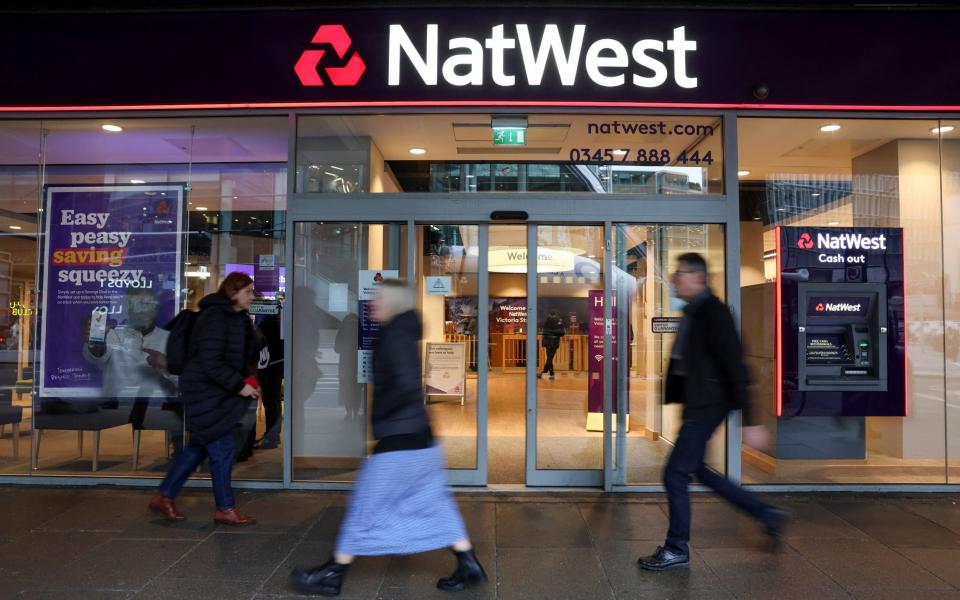
09:10 AM GMT
Hunt: I've made a start in bringing down the tax burden
Jeremy Hunt has denied that it is fundamentally dishonest of the Tories to claim it is the largest tax cut ever for workers when the tax take is rising.
Asked the question, the Chancellor told BBC Radio 4’s Today programme: “I fundamentally disagree with that.”
He said “of course” taxes were going up “so we can pay down our Covid debt”.
Mr Hunt added: “But yesterday I did make a start in bringing down the tax burden. I’ve never said that we were going to get there all in one go.”
08:55 AM GMT
Oil and gas companies lift FTSE 100
The FTSE 100 has risen as it was supported by a rise in oil and gas shares, while Virgin Money fell on a drop in annual profit.
The commodity-heavy index rose 0.3pc in early trading, while the mid-cap FTSE 250 index slipped 0.2pc.
Oil and gas shares climbed as much as 1.2pc with BP topping the FTSE 100, while real estate investment trusts were the top decliner, falling as much as 0.8pc.
Virgin Money reported a drop in its full-year profit, taking the shares down by as much as 2.3pc.
Jet2 posted a 19pc jump in operating profit for the six months to the end of September. However, shares of the travel company dropped as much as 5.8pc.
PZ Cussons said it expects only a minimal surplus cash position remaining in its Nigeria business beyond what is required for trading by the end of its current financial year. The soap maker jumped as much as 1.5pc.
Intertek rose 1pc after the product testing firm confirmed its annual forecast.
08:42 AM GMT
Hunt refuses to rule out early Spring Budget
Jeremy Hunt insisted he has not discussed the timing of the general election with Rishi Sunak, but did not rule out an early spring Budget.
“I can confirm regarding the date of the election that I’ve had absolutely no discussions with the Prime Minister,” the Chancellor told LBC Radio.
He said the National Insurance cut will be brought forward from April to take effect in January because “I want to bring help for families as soon as possible” as energy bills continue to rise.
Asked if he could rule out February as the date for the next Budget, the senior Tory said:
I can’t rule out anything because I haven’t taken any decisions.
Normally it’s in March, but we will make a decision at the appropriate time.
08:34 AM GMT
Jet2 landed with £14m hit after air traffic control chaos and Greek wildfires
Travel company Jet2 has said it took a £14m hit from the summer’s air traffic control chaos and wildfires and flooding on Greek islands.
But the business said it had seen a major jump in profit nonetheless, in part because of the higher amount it was able to make per customer.
It said that the average price of a Jet2holiday package rose 11pc to £855 in the six months to the end of September.
The business also saw its net ticket yield for customers only buying flights increase by 18pc to a little over £124.
That helped the business’s pre-tax profit rise from £451m to £661m in the six-month period.
The business told shareholders that the mix of the disruption to the National Air Traffic Services (Nats), wildfires on Rhodes which were largely blamed on climate change and flooding in Skiathos had cost it around £14m of lost profitability.
The company’s shares were down 2.7pc in early trading.
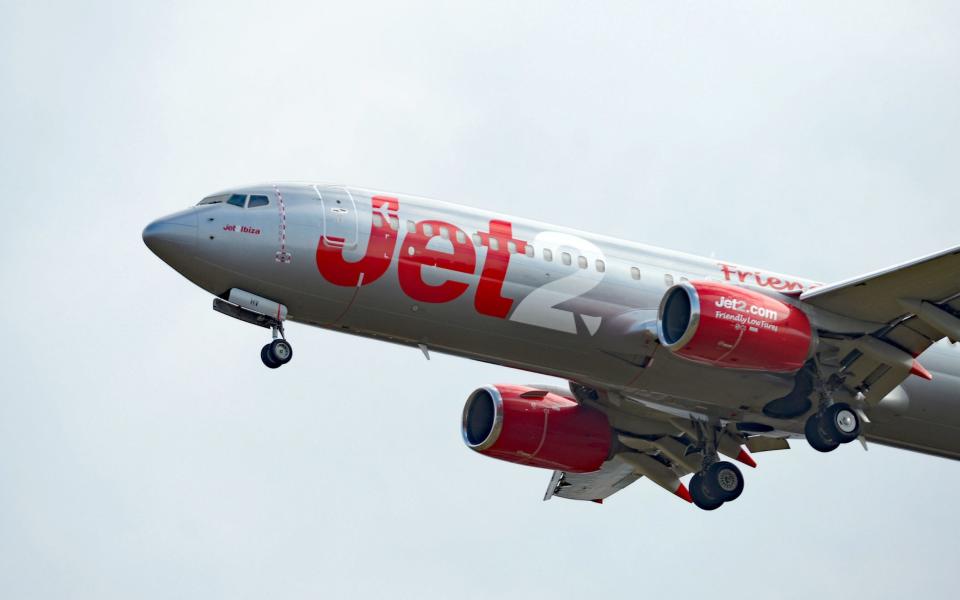
08:24 AM GMT
If you aren't sick or disabled you should look for work, says Hunt
People should not be parked on benefits for life, Chancellor Jeremy Hunt has said.
After announcing welfare reforms in his Autumn Statement, he told LBC Radio:
We increased benefits yesterday by double the next year’s predicted inflation.
But we do also say if you’re on benefits and you don’t have a sickness or a disability, you should be looking for work.
If you have mental health difficulties, we think the default should be to treat those mental health issues, not to park you on benefits for the rest of your life without any help with getting into work.
08:17 AM GMT
Virgin Money sets aside £309m for bad loans
Virgin Money suffered a drop in profits as it set aside more money for loans it expects to turn sour but also revealed plans to increase share buybacks in a boost to investors.
Britain’s sixth-biggest lender said pre-tax profits tumbled 42pc to £345m as it set aside £309m for credit card impairment charges, up from £52m the previous year.
However, it said it will buy back another £150m of its shares as its margins continue to benefit from high interest rates.
Virgin Money has also unveiled plans to spend £130m on artificial intelligence (AI) and technology to help fight fraud and cyber crime, but said it would need to ramp up cost savings to pay for the investment.
The high street lender said the spending programme would span three years, with around £40m earmarked for 2023-24, and comes as AI and other new technologies have increased the “sophistication and risk of attacks”.
Virgin Money said it would need to cut costs by £200m a year, up from £175m previously, to pay for the plans through “further strategic rationalisation of our real estate portfolio, outsourcing and systems simplification”.
Its shares were down 0.8pc in early trading as it added the plans would put back goals to boost its financial performance.
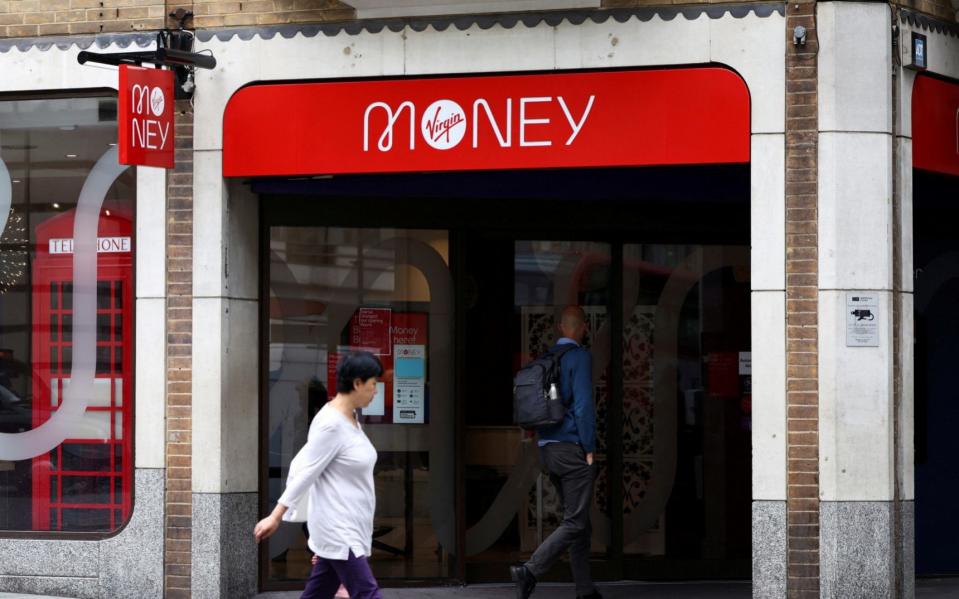
08:04 AM GMT
FTSE 100 rises at the open
The FTSE 100 rose as investors digested the implications of the Autumn Statement, which delivered tax cuts for companies investing in plant and machinery.
The UK’s benchmark stock index gained 0.2pc to 7,482.58 while the midcaps FTSE 250 was flat at 18,474.67.
07:58 AM GMT
We have not made 'populist' pre-election tax cuts, insists Hunt
Jeremy Hunt said it is “silly” to think about his tax cuts as a pre-election giveaway.
The Chancellor told Sky News:
We haven’t chosen the most populist tax cuts.
I think it’s silly to think about this in terms of the timing of the next election.
We’re trying to make the right decisions for the long-term growth of the British economy.
He went on to point out the difference between the Tories’ and Labour’s approach to the economy, saying the opposition party would raise borrowing.
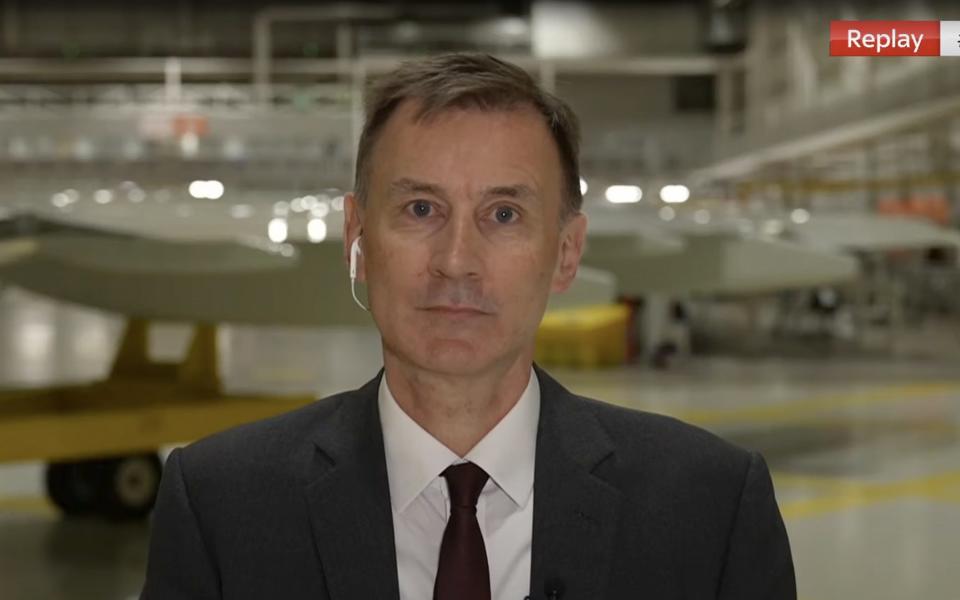
07:55 AM GMT
Gas prices up 30pc since start of Israel-Hamar conflict
The 5pc increase in the energy price cap comes as the cost of wholesale gas has increased by 30pc since Hamas launched its deadly attack on Israel on October 7.
UK gas prices have risen from about 90p per therm to more than 116p during that time, having peaked at more than 136p shortly after the outbreak of the conflict.
The equivalent contract in Europe has gained more than a quarter since the start of the war.
The conflict came as gas prices entered a period where they usually begin to rise anyway amid increased demand over winter.
07:47 AM GMT
Hunt: Autumn Statement will 'make a difference' in face of rising energy bills
The Chancellor said he recognises that lots of households “are struggling” in the face of the rise in energy bills due to come into force in January.
However, he told BBC Breakfast that the Autumn Statement includes decisions “that will make a difference” such as the increase in the state pension and cuts to National Insurance.
He added that this would help households “at the same time as doing the right thing to grow the economy in the long run”.
07:41 AM GMT
Households will have to choose between heating and eating, says Citizens Advice
After Ofgem raised its price cap on energy bills, Gillian Cooper, director of energy at Citizens Advice, said:
Prices going up during the coldest part of the year will make life harder for millions of people already struggling to pay their bills.
We’re already helping record numbers with energy debt and we’re seeing more people than ever who can’t afford to top up their prepayment meter.
Yesterday, the Government missed the opportunity to announce extra support for households who desperately need it this winter.
The lack of action means far too many households will now be forced to choose between heating and eating this winter.
We urgently need the Government to honour its commitment to look at options for providing targeted financial support with energy bills from April 2024.
07:37 AM GMT
Ofgem raises cap amid rising wholesale gas prices
Ofgem said that it has increased its price cap as a result of the rising cost of wholesale gas in recent months.
It put this down to world events “including the conflict in the Middle East”.
Israel closed its Tamar gas field in the Mediterranean Sea for about a month following the outbreak of its war with Hamas.
The average household energy bill will rise by £7.83 a month over the course of a year under the cap.
More precisely, from January 1, for a typical user paying by direct debit, the unit rate will be 29p per kWh for electricity and 7p per kWh for gas.
The average daily standing charge will be 53p per day for electricity and 30p per day for gas.
07:25 AM GMT
We need to grow the economy to invest in the NHS and schools, says Hunt
Jeremy Hunt is doing a long round with broadcast media this morning following his tax-cutting Autumn Statement.
He has denied his decision not to increase public spending in line with inflation will result in worse public services.
Asked the question, the Chancellor told Times Radio:
No, and the reason is very straightforward. If we want to have money to invest in the NHS, in schools, in our armed forces over the longer term, you have to grow the economy.
That is the only way in the longer run that you can fund the cost of an ageing population and that’s why I took those decisions for the long term.
In the short run, I am showing discipline with public spending. I think that is the right thing to do. We need a more productive state, not a bigger state.
07:23 AM GMT
Hunt: You need to grow the cake before you cut it up
Chancellor Jeremy Hunt has insisted that the tax cuts he announced in the Autumn Statement were “the single biggest thing I could do for long-term growth”.
Speaking from the Airbus factory in north Wales, he told Times Radio that he opted for national insurance and business tax cuts because they “will make the biggest difference to our long-term competitiveness”.
He said:
It’s a fundamental Conservative principle that we think you need to grow the cake before you have discussions about how you cut it up.
I can make a start - and that’s what I did yesterday - in reducing the tax burden, but I’ve chosen to do it in a way that’s going to grow the economy.
07:07 AM GMT
Household energy bills to rise as Ofgem lifts price cap
Households will pay an extra £94 on average per year on their energy bills after Ofgem raised its price cap.
The regulator has announced it will raise its limit on what gas and electricity suppliers can charge customers from an average of £1,834 to £1,928 from January 1.
Ofgem said the rise was caused by rising wholesale gas prices, which had been affected by world events “including the conflict in the Middle East”.
The announcement comes a day after the Chancellor announced 27 million workers will benefit from cuts to National Insurance that will save the average person £450 a year.
However, Jeremy Hunt’s Autumn Statement made no mention of any further help to offset household energy bills as he did last winter.
Forecasters Cornwall Insight predict the typical bill will fall to £1,853 from the start of April, but will not drop below today’s level until July next year.
The energy consultancy said recent milder weather was helping to bring down gas prices, and this could help reduce bills next year if it continued.
Ofgem chief executive Jonathan Brearley said:
This is a difficult time for many people, and any increase in bills will be worrying. But this rise – around the levels we saw in August – is a result of the wholesale cost of gas and electricity rising, which needs to be reflected in the price that we all pay.
It is important that customers are supported and we have made clear to suppliers that we expect them to identify and offer help to those who are struggling with bills.
We are also seeing the return of choice to the market, which is a positive sign and customers could benefit from shopping around with a range of tariffs now available offering the security of a fixed rate or a more flexible deal that tracks below the price cap.
People should weigh up all the information, seek independent advice from trusted sources and consider what is most important for them whether that’s the lowest price or the security of a fixed deal.
07:02 AM GMT
Good morning
Thanks for joining me. Ofgem has raised its energy price cap meaning that from January households will typically pay an extra £94 a year on their gas and electricity bills.
The regulator said the limit on average household energy bills would rise from £1,834 to £1,928 from January 1.
5 things to start your day
1) Szu Ping Chan: Autumn Statement can’t conceal the worrying truth about Britain’s future | Growth prospects in an election year have not been this weak since the early 1990s
2) Jeremy Warner: Like it or not, the Chancellor played a bad hand well | Under the weight of a rising tax burden, the Autumn Statement became a masterclass in illusion
3) Should you invest in NatWest if the Government offers cut-price shares? | The Chancellor plans a new ‘tell Sid’ share sale
4) Asda co-owner threatened with contempt charge over claims he ‘misled’ Parliament | Claims against Mohsin Issa concern evidence he submitted to Business and Trade Committee
5) Sam Altman wins power struggle at OpenAI as he returns amid board clearout | Co-founder to be reinstated as chief executive after hundreds of staff threatened to quit
What happened overnight
Asian shares were flat in thin trading as US markets close for Thanksgiving, while Japan’s stock indexes were also shut for holidays.
Meanwhile oil prices fell on the prospects for smaller-than-expected output cuts by Opec+.
MSCI’s broadest index of Asia-Pacific shares outside Japan was flat in thin trading, with Japan and the United States on holiday.
Investors are looking to Chinese policymakers for clues on possible support for the long-suffering property market, in line with broader growth targets they are hammering out.
China’s benchmark share index fell 0.2pc, with the real estate sub-index retrieved earlier losses to gain 2.1pc.
On Wall Street, the Dow Jones Industrial Average of 30 leading American companies rose 0.5pc on Wednesday to 35,273.03.
The Nasdaq Composite index, seen as a bellwether of the US technology sector, rose 0.5pc to 14,265.86.
The broader S&P 500 index rose 0.4pc to 4,556.62. The yield on 10-year US Treasury bonds rose two basis points to 4.41pc.
Back in Blighty, while everyone was focused on the Autumn Statement on Wednesday, the FTSE 100 dropped 0.2pc to 7,469.51 while the FTSE 250 rose 0.7pc to 18,480.17.
Accountancy software firm Sage Group did especially well on the London Stock Exchange, rising 13.3pc after beating analyst estimates as the firm’s investments in artificial intelligence attracted interest from customers.

 Yahoo Finance
Yahoo Finance 